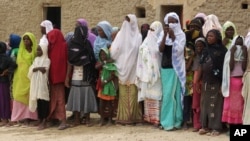Human rights organizations have filed a complaint on behalf of 80 survivors of rape and sexual violence during the occupation of northern Mali.
More than 2,000 women and girls were subject to rape or forced marriages in 2012-2013 when Islamist extremists and separatist rebels took control of Gao and Timbuktu. This is the first independent attempt to bring justice for the victims.
When Gao and Timbuktu first came under occupation in January 2012, hundreds of women and young girls were raped, often by several offenders. In the summer of that year, when Islamist militants took power in the occupied towns, they imposed a system of forced marriage.
Attacks on women
While the rebels would attack women on their way to the field, going to fetch water or even in their homes, the Islamists had a different approach, says lawyer and human rights defender Moctar Mariko.
“The MUJAO (Movement for Oneness and Jihad in West Africa) forced women to marry them,” which, Mariko says, “resulted in another system of rape when only one man married the woman, who was then forced to sleep with several other men.”
Human rights groups and local NGOs have identified at least 2,700 survivors of rape and sexual violence between March 2012 and early 2013 in Gao, Kidal and Timbuktu.
In Gao the main offenders were the rebels of The National Movement for the Liberation of Azawad, MNLA, and later MUJAO.
In Timbuktu Ansar Dine, another Islamist group, and al-Qaida in the Islamic Maghreb, AQIM, committed a majority of the violations against women.
Little redress
To date, very little has been done to help the women.
There are still no proper courts or a functioning legal system in the north and investigations are slow, Mariko says. He points out that “cases referred to the police were never investigated.”
Together with Malian human rights association, AMDH, and French human rights group FIDH, Mariko represents 80 women who are survivors of the sexual violence.
The oldest victim was over 60 years old, the youngest only 7.
While many women fled during that time, some stayed behind. But for those who have returned, many are forced to face their aggressors on a daily basis as some of the perpetrators have been released in prison exchanges between the armed groups and the Malian government.
“Sometimes the offender is a neighbor or even a family member who joined the rebels. This poses a direct threat to the women,” says Mariam Seck with NGO Sini Sanuman.
The organization has helped women with medical assistance, counseling, safe places to stay and help to start their legal complaints.
But even if women are ready to take their case to court, they face another obstacle. The majority of the offenders remain in the north while the victims fled to the south.
So, early this year a group of lawyers traveled north to Gao, Timbuktu and Konna where they worked with women’s groups to identify victims. The women were later brought to Bamako where the lawyers collected their testimonies.
'Long-term consequences'
While many women do know their offenders, some could only identify them by the language they spoke or what they were wearing, Mariko says.
“These are truly horrific crimes with long-term consequences for many. They were not only physically violated but suffered social stigma,” he says. “In some cases, their husbands left when they learned the rebels had raped their wife. Others became pregnant as a result of the assault,” Mariko says.
Some women tell their daughters to keep quiet about what the armed men did to them, not even telling their husbands, afraid their daughters will not be married.
Lawyers are expensive for the ordinary Malian and court cases drag on. Another problem is that many victims can’t read or write and aren’t aware of their rights.
Human rights defenders - by going to the victims - now hope more women will dare to file complaints as the first cases move to court.




